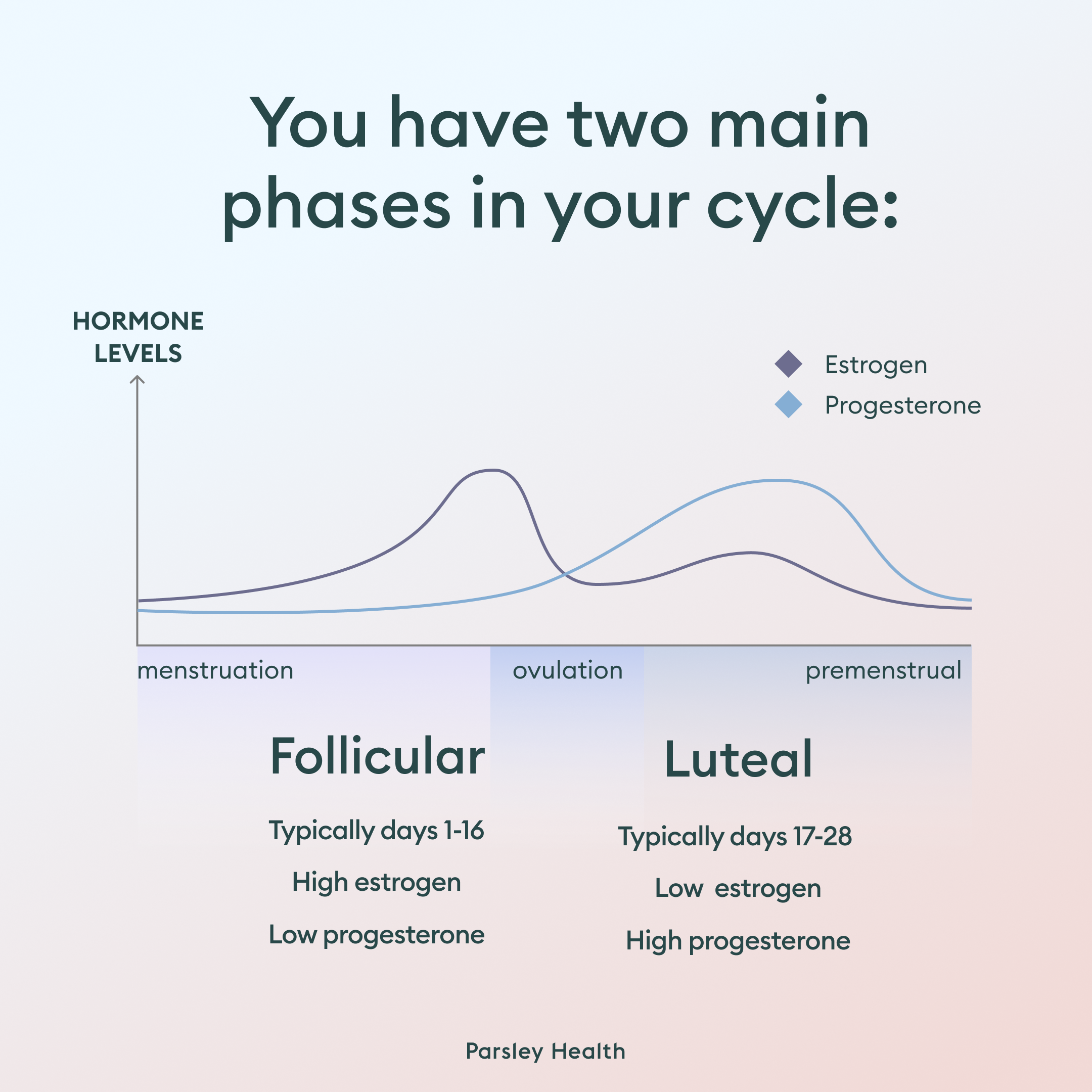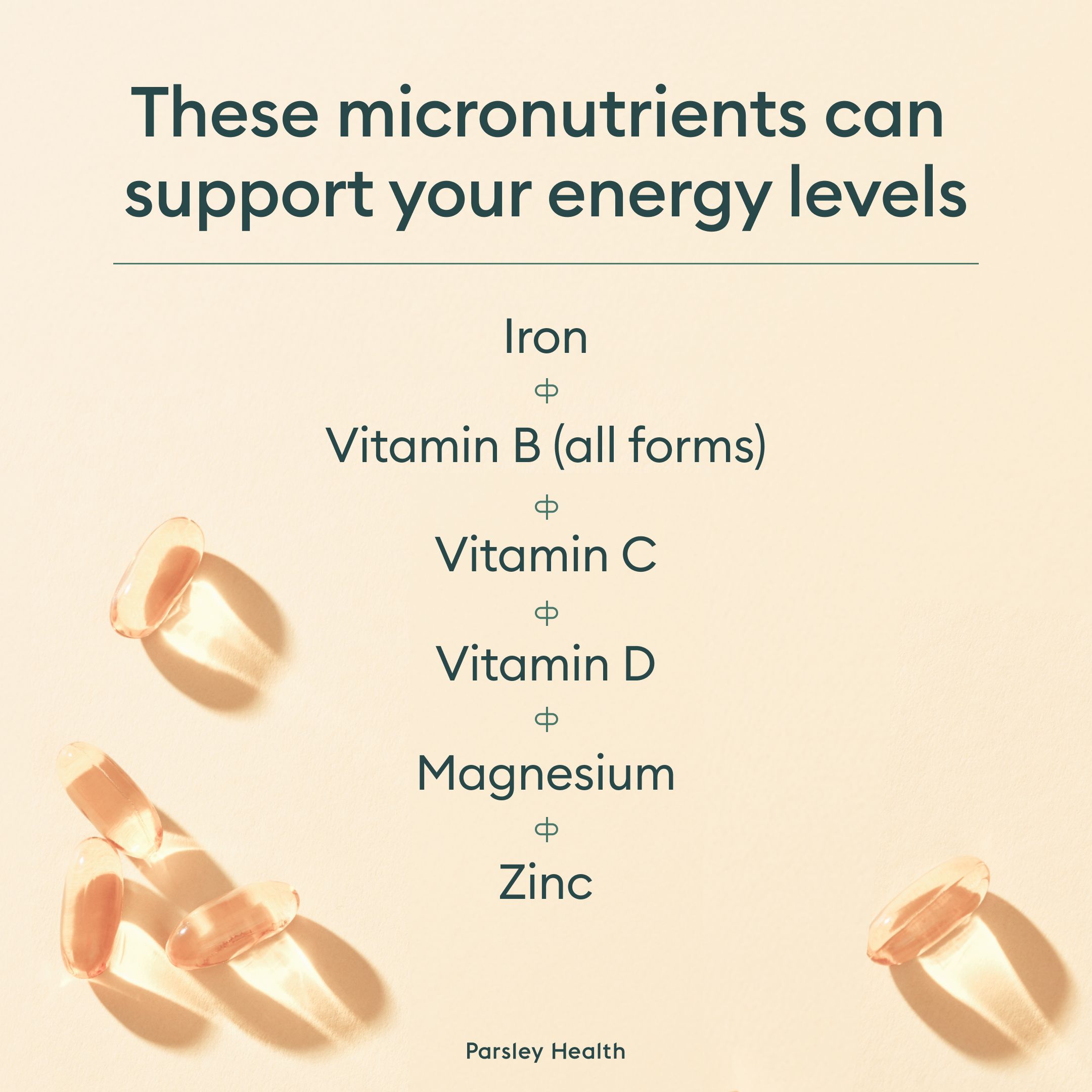The first thing to know is that experiencing a little fatigue before your period, or during it, is normal and a result of hormonal fluctuations that occur in the luteal phase.
Here’s a common scenario: One day you’re crushing it in your workout. Those weight reps at the gym feel kind of easy or the miles on your run just fly by. But a week later, you’re struggling to complete the same number of reps or cover the same distance as before. Maybe you even grappled a bit with finding the motivation to lace up your shoes and get out the door. What’s the deal? Check your calendar. Your period might be on the way.
Again, a little fatigue during this time is normal and a reminder to be gentle with yourself. But if you’re experiencing extreme fatigue before your period, something else might be going on.
In this article, we’ll explore why fatigue commonly occurs before and during menstruation, how to combat it, and what to do if you’re experiencing extreme changes in your energy levels that impact your daily functioning.
“Understanding that an underlying health condition may cause fatigue is the first step toward addressing it and empowering women to continue discussing this concern with their healthcare provider until they have answers,” says Tara Harding, DNP, a doctorate nurse practitioner and fertility coach working with BOND, a supplement brand.
Understanding the menstrual cycle and fatigue
To understand why fatigue is common just before you get your period, we must first tackle some terms related to the menstrual cycle. Cycle lengths vary from person to person, with the average cycle lasting 28 days. However, some people have cycles that are only 21 days, while others have cycles that last slightly longer than a month.

Your cycle has two main phases
- Follicular (days 1 to 14): The follicular phase begins the first day you get your period and lasts until ovulation.
- Luteal (days 15 to 28): The luteal phase begins at ovulation and lasts until you get your period.
The hormones involved in the menstrual cycle
- Follicular stimulating hormone (FSH)
- Luteinizing hormone (LH)
- Estrogen
- Progesterone
Your cycle occurs along what’s called the hypothalamic pituitary gonadal (HPG) axis. For people assigned female at birth, the gonads are the ovaries. Along the HPG axis, your ovaries, your brain’s hypothalamus, and your pituitary gland (located at the base of your brain) are in communication along this axis. When a hormone releases, it signals your body to release another in a feedback loop.
Your cycle starts on the first day of your period, kicking off the follicular phase. The closer to ovulation you get, the more your estrogen level climbs, peaking just before ovulation. Researchers theorize that this estrogen surge gives people an energy boost or a boost in motivation mid-cycle.
The luteal phase starts with ovulation. Right at ovulation, estrogen plummets before rising slightly again post-ovulation and dropping again right before your period. Think of this rise and fall as a mini hill. Meanwhile, progesterone rises into more of a mountain during the luteal phase and plummets before your period.
When compared to the follicular phase, fatigue is more common in the luteal phase. Likely this is because both high and low levels of progesterone are associated with fatigue. Keeping this in mind, fatigue may be highest from around day 22 to day 28 of your menstrual cycle if you have a 28-day cycle.
Some research indicates that the luteal phase also causes the body to temporarily become more insulin-resistant. Insulin is a hormone your pancreatic beta cells produce. The hormone is generally released when we eat. It helps get glucose (blood sugar) from our bloodstream into our cells to be used as energy.
From evidence in both animal and human studies, researchers theorize that the body is directing its energy needs toward the growing endometrium during the luteal phase. Insulin resistance can naturally make you feel more fatigued because it impairs how efficiently your body can access energy from the foods you eat.
Premenstrual syndrome and fatigue
Premenstrual syndrome (PMS) involves any changes you notice in your mental and physical health leading up to your period that impact your daily functioning or lead to distress. Nearly half of those who menstruate experience PMS. Symptoms vary, but fatigue is common.
PMS symptoms
- Anger
- Anxiety
- Appetite changes
- Back pain
- Bloating
- Breast tenderness/swelling
- Cramps or abdominal pain
- Fatigue
- Gastrointestinal issues (diarrhea, constipation)
- Headache
- Irritability
- Migraine
- Mood fluctuations
- Nausea
- Sleep disturbances
- Weight gain
“Your body is going through significant changes during your menstrual cycle, so experiencing some level of fatigue before your period is entirely normal,” Dr. Harding says. “Please allow yourself to slow down, rest, and listen to your body’s needs.”
Additionally, you may notice an uptick in PMS symptoms if you are in perimenopause. Perimenopause is considered the menopause transition. It can begin more than a decade before you reach menopause, which is the absence of a period for a full year. During perimenopause, your hormones can go through major fluctuations, causing irregular periods and fatigue.
Medical conditions, the menstrual cycle, and fatigue
PMS-related fatigue is common, but that doesn’t mean it’s always normal. If you experience severe fatigue or other intense symptoms surrounding your period or otherwise, you may have an underlying medical condition. Here are some to be aware of and talk to your doctor about.
Premenstrual dysphoric disorder
Premenstrual dysphoric disorder (PMDD) is a severe form of PMS. The condition is listed in the Diagnostic and Statistical Manual for Mental Disorders, Fifth Edition (DSM-5). Up to 8 percent of menstruating people have PMDD.
“For those who are diagnosed with PMDD,” Dr. Harding says, “it is believed they may have an abnormal reaction to normal hormone changes that happen with each menstrual cycle. The hormone changes can cause a serotonin deficiency. Serotonin is a substance found naturally in the brain and intestines that narrows blood vessels and can affect mood and cause physical symptoms.”
Additional contributing factors may include a hormonal imbalance, a gut health issue, micronutrient deficiencies, and exposure to endocrine disrupting chemicals.
If you are having severe PMS symptoms that impact your functioning, be sure to talk to a clinician about your concerns so you can receive proper evaluation and treatment.
Polycystic ovary syndrome
Polycystic ovary syndrome (PCOS) is an endocrine and metabolic health disorder that has three main features: irregular periods, excess levels of androgens (such as testosterone), and polycystic ovaries, where the ovaries become enlarged and contain fluid-filled follicles. PCOS is a leading cause of fertility issues and affects an estimated 13 percent of people assigned female at birth, though it often goes undiagnosed.
A common symptom of PCOS is fatigue. This fatigue may be related to several factors, including insulin resistance, sleep disturbances, depression, and more.
PCOS is a serious condition that can dramatically affect quality of life. If you are experiencing irregular periods, acne, unwanted hair growth such as on the face, fertility issues, weight fluctuations, or other unexplained symptoms, talk to a knowledgeable clinician.
Endometriosis
Endometriosis is a systemic inflammatory condition in which tissue that mimics the endometrium grows outside the uterus. These growths, called legions, have been found in nearly every organ of the body. The legions secrete inflammatory molecules, cause internal bleeding because the tissue responds to hormonal changes, and can lead to adhesions. Adhesions are when tissue or organs begin to stick together.
The condition affects about 10 percent of people assigned female at birth. In rare cases it can affect the male body. On average, people wait a decade before finally receiving a proper diagnosis.
Pelvic pain is a common symptom, but so is fatigue. If you are experiencing pelvic pain that goes beyond minor cramping or occurs at odd times during your cycle, be sure to speak to a knowledgeable clinician about your symptoms so you can receive adequate treatment.
Iron deficiency
Iron deficiency, which can lead to iron deficiency anemia, is a common cause of fatigue. Iron deficiency anemia means your body doesn’t have enough iron. Therefore, it has difficulty producing healthy red blood cells and sending oxygen to your organs.
Heavy menstrual bleeding can cause iron deficiency. If you take blood thinners (also called anti-coagulants), you may be more at risk for heavy menstrual bleeding and iron deficiency. If you feel fatigued and have decreased tolerance for exercise, be sure to talk to a clinician who can evaluate your iron levels.
Hypothyroidism and hyperthyroidism
Fatigue is a common symptom of both hypothyroidism (underactive thyroid) and hyperthyroidism (overactive thyroid), collectively known as thyroid disease. Thyroid disease can impact your menstrual cycle, leading to light, heavy, or irregular periods. Or it may cause an absence of a period for several months.
If you’re experiencing issues with your menstrual cycle, along with fatigue, weight changes, feeling unusually cold or hot, or other unexplained symptoms, talk to a clinician who can help.
Lifestyle changes to alleviate fatigue
If you have an underlying medical condition that is contributing to fatigue, treatment for that condition may improve your energy levels. Lifestyle changes can be a part of your treatment plan.
If you’re experiencing mild fatigue before your period and you want to find ways to feel more energetic, here are some considerations from the experts we interviewed.
Get regular exercise
“Light activities, like yoga or walking, can give you more energy and make you feel happier,” says Peter Brukner, MD, a U.S. board-certified nutritionist, dietitian, and author based in Australia. “This happens because it helps blood move better in your body and lets out endorphins (the happy chemicals in your brain).”
Dr. Harding agrees, saying that light activities are best the closer you are to your period to avoid overexertion but remain active. Switching to low-impact activities rather than high-intensity exercise can also be a great strategy if you notice a drop in motivation to get moving.
Get adequate sleep
“Your body needs seven to nine hours of good sleep each night,” Dr. Brukner says, “especially before your period. Try to go to bed and wake up at the same time every day so you keep your body’s inner clock steady.”
Manage stress
The HPG axis, which controls your menstrual cycle, also overlaps with the hypothalamic-pituitary-adrenal (HPA axis), the axis concerned with your stress response. Managing stress throughout your menstrual cycle may help alleviate fatigue.
“Stress can make tiredness more intense. Try methods to relax such as deep breathing, meditation, or even taking small breaks during the day to refresh your mind,” Dr. Brukner says.
Cortisol, the stress hormone, can make PMDD worse. Although exercise can be a natural stress reliever, avoid high-intensity forms in the week before your period.
Dietary changes to combat fatigue
Focusing on diet can also be an important lifestyle change that can help combat fatigue. Here are some considerations.
Focus on whole foods
Ultra-processed foods are often laden with added sugar and refined carbohydrates, which can spike your blood sugar. Blood sugar spikes are often followed by energy crashes in a phenomenon called reactive hypoglycemia. These crashes can cause fatigue, along with cravings for more ultra-processed foods to counteract the energy plummet.
“Changes in blood sugar can make tiredness worse,” says Dr. Brukner, the author of “Fat Lot of Good,” a book on the importance of eating healthy fats. “Eat whole, natural foods for stable energy levels. These have whole grains (like oats or brown rice), lean proteins (like chicken, fish, or beans), and good fats (like avocados or nuts).”
Focus on adding in fiber, especially in the form of cruciferous vegetables, such as broccoli, cauliflower, kale, arugula, and Brussels sprouts. Fiber and cruciferous vegetables have beneficial effects on blood sugar.
During the late luteal phase of your menstrual cycle, you may need to consume more carbohydrates. Eating more fruits and veggies can help, and you can get a boost from whole grains.
Omega-3 fatty acids are particularly important for fighting fatigue. “Omega-3s are in fatty fish, such as salmon and seeds like flaxseeds,” Dr. Brukner says. “They help lower inflammation and aid brain health, which can make you feel less tired.”
Get optimal levels of micronutrients
Micronutrients are the vitamins and minerals our bodies need to support optimal functioning. Micronutrients are best gleaned from a healthy diet. But some people may need a little more support if they’re experiencing a deficiency, have an issue with nutrient absorption, or eat a vegan or vegetarian diet. Before taking any supplements, be sure to consult a clinician who can test your levels if needed and make recommendations.

These micronutrients can support your energy levels
- Iron
- Vitamin B (all forms)
- Vitamin C
- Vitamin D
- Magnesium
- Zinc
FAQ
Why do you feel tired before your period?
You may naturally feel a little more fatigued right before your period because of hormonal fluctuations that occur during the luteal phase. However, if you are experiencing extreme fatigue or other symptoms, be sure to talk to a clinician who can help you investigate any additional contributing factors.
How long does period fatigue last?
Although everyone is different, period fatigue may last from a few days up to about a week.
When in your menstrual cycle are you most tired?
Everyone’s cycle is slightly different. However, the most common time to experience period fatigue is in the week before your period and during the first few days of your menses.
How do you get rid of period fatigue?
You can combat fatigue by prioritizing sleep, managing stress, engaging in light physical activity, and ensuring optimal nutrition.









